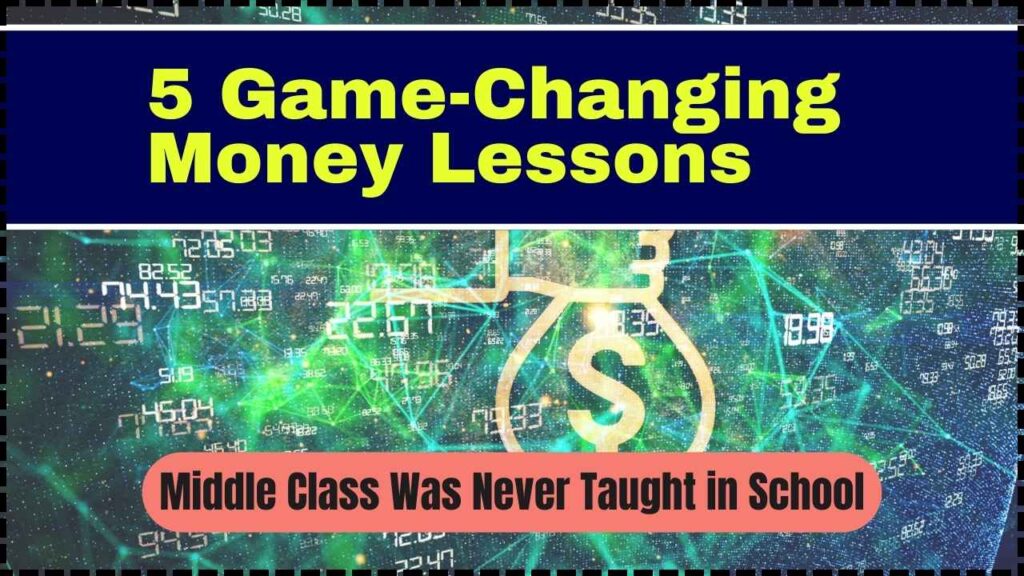5 Game-Changing Money Lessons: Many middle-class families across the world grow up with one key belief: go to school, get good grades, and you’ll be set for life. But there’s one major subject that’s almost always missing from this equation — financial literacy. Schools teach algebra and history, but rarely do they equip students with practical, real-world knowledge about managing money, debt, credit, or investing.
The consequences of this educational gap are huge. Millions of people end up making avoidable financial mistakes simply because they were never taught how money really works. The good news? It’s never too late to learn. Whether you’re a working professional, a parent, or just starting out, these five money lessons can completely change the way you think about and manage your finances.
5 Game-Changing Money Lessons
The truth is this: your financial future isn’t decided by how much you earn — it’s decided by what you do with what you earn. These five game-changing money lessons — from the magic of compound interest to smart investing and emergency preparedness — provide a roadmap to a more secure, confident, and free financial life. Schools may not have taught these lessons, but now you know them. And with that knowledge comes power — the power to build wealth, avoid debt traps, prepare for the unexpected, and create lasting financial security for you and your family.

| Lesson | What You Learn | Key Statistic or Insight | Why It Matters Professionally |
|---|---|---|---|
| Compound Interest | Grow your money faster over time | $300/month at 8% for 40 years = $935,000+ | Critical for retirement savings and wealth growth |
| Credit & Debt | Use credit wisely, avoid debt traps | 46% of U.S. households have credit card debt | Impacts mortgage rates, job applications, and financial credibility |
| Tax Fundamentals | Lower your tax bill legally | Millions overpay taxes due to lack of knowledge | Saves money, aids in budgeting and investment |
| Emergency Funds | Prepare for life’s unexpected costs | 57% of Americans can’t cover a $1,000 emergency (Bankrate, 2023) | Prevents financial stress and job-related instability |
| Investing Wisely | Grow long-term wealth | Diversified portfolios earn higher long-term returns | Enables early retirement, business funding, wealth transfer |
5 Game-Changing Money Lessons the Middle Class Was Never Taught in School
1. Harnessing the Power of Compound Interest
Compound interest is often called the eighth wonder of the world. Why? Because it allows your money to earn more money — and then that money earns more money. It’s growth that builds on itself.
Let’s say you invest $300 a month at an 8% annual return. After 40 years, you’ll have over $935,000 — and only $144,000 of that is money you put in. The rest? Pure growth.
If you delay investing by just 10 years, you’ll need to invest over $600/month to reach the same goal. The earlier you start, the better.
Tip: Open a Roth IRA or start with a low-cost index fund like those offered by Vanguard or Fidelity.
2. Understanding Credit and Debt Management
Credit isn’t evil. In fact, good credit can save you tens of thousands of dollars over your lifetime. But poor credit decisions can trap you in high-interest debt that’s hard to escape.
The average credit card interest rate is now over 20% ). That means if you carry a balance, your purchases could cost double in the long run.
Credit scores (FICO) range from 300 to 850. A score above 740 can get you better rates on mortgages, car loans, and even insurance.
Tip: Always pay your credit card bill in full and on time. Don’t max out your cards — keep usage below 30% of your limit.
3. Grasping Tax Fundamentals
Most people pay more in taxes than they have to — not because of fraud or cheating, but because they just don’t understand the system.
Knowing how tax brackets work, what’s tax-deductible, and how to claim credits can save you thousands. For instance, if you’re a freelancer, you may be able to deduct part of your home expenses.
Understanding the difference between tax-deferred (like 401(k)s) and tax-free (like Roth IRAs) accounts helps you plan smarter for retirement.
4. Building and Maintaining an Emergency Fund
Financial emergencies are not a matter of “if” — but “when.”
Whether it’s a medical bill, job loss, or car repair, having an emergency fund can protect you from having to go into debt when life happens.
Experts recommend saving 3–6 months of living expenses in a separate, easily accessible savings account. Start small if you must — even $500 can be life-changing in an emergency.
Tip: Automate your savings. Set up a recurring monthly transfer to a high-yield savings account.
5. Investing Wisely for the Future
Investing might seem scary, especially if you weren’t taught about it. But with the right strategy, it can be simple and incredibly effective.
The best part? You don’t need to be rich. You just need consistency.
Start by understanding the stock market basics, including risk, diversification, and long-term vs. short-term strategies. Use robo-advisors, index funds, or brokerage platforms that require no minimums.
Tip: Don’t try to “time the market.” Instead, invest regularly and stay invested. The market goes up and down — but historically, it grows over time.
Bonus Lesson: Understanding Financial Psychology
Your beliefs about money — often learned in childhood — shape how you spend, save, and invest.
If you grew up hearing “we can’t afford that” or “money is evil,” those attitudes might still influence your decisions today. Learning how to manage money mindset is crucial for breaking the cycle.
Tip: Read books like “Your Money or Your Life” or “The Psychology of Money” to reshape your financial thinking.
IRS 2025 Tax Brackets – Check 10%, 22%, 24%, 32%, 35% & 37% Tax Rate
Ultra-High Yield Dividend Stocks: 5 Top Picks for USA Retirees in 2025
Frequently Asked Questions (FAQs)
Q1: How can I get started if I’m already in debt?
A: Start by tracking your expenses. Create a realistic budget, prioritize high-interest debt (like credit cards), and explore debt payoff strategies like the Avalanche (highest interest first) or Snowball (smallest balance first).
Q2: I have no investment experience. What’s a safe way to start?
A: Consider opening a Robo-advisor account (like Betterment or Wealthfront), which automates everything based on your goals. You can also invest in low-cost index funds that track the market and require minimal effort.
Q3: How much do I need in my emergency fund?
A: Ideally, 3–6 months’ worth of essential expenses. If that feels overwhelming, aim for $1,000 as a starter goal, then build from there.
Q4: Are there any free tools to help me learn these concepts?
A: Yes! Try Investor.gov, MyMoney.gov, and Mint for budgeting and financial planning.
Q5: How do I know if I’m saving enough for retirement?
A: A common rule is to save at least 15% of your income.








